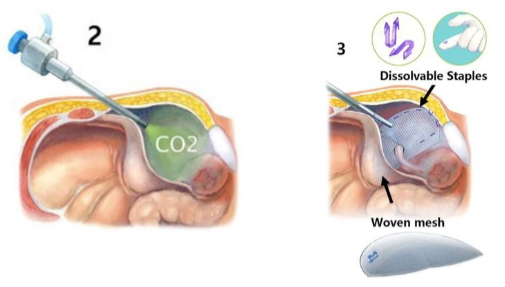

Will I need Surgery?
- Asymptomatic hernia in the elderly do not need any surgical treatment.
- If symptomatic, we do recommend surgical repair as they can get bigger over time and have the potential to cause a medical emergency by trapping bowels.
Am I a suitable candidate for laparoscopic (keyhole) surgery?
- Laparoscopic surgery is not suitable for everyone, particularly if you have had previous abdominal surgery or you have underlying medical conditions.
- The National Institute for Clinical Excellence (NICE) has reviewed this procedure and recommends that laparoscopic surgery can be used as one of the treatment options for the repair of inguinal hernia. You can obtain more detailed information about this procedure from their website www.nice.org.uk.
- Factors that may increase the possibility of choosing or converting to the “open” procedure may include
- Obesity
- History of prior abdominal surgery causing dense scar tissue
- Bleeding problems during the operation
- Very large hernia
What are the advantages and disadvantages of laparoscopic surgery over “open”surgery?
- One of the benefits of laparoscopic hernia surgery over “open” hernia surgery is that you can usually return to work and normal activities more quickly.
- There may also be a lower risk of developing persistent numbness and pain in the groin after surgery and a smaller incidence of wound infection.
- The disadvantage of laparoscopic surgery is that there is a slightly higher risk of injury to surrounding structures (such as the bowel, bladder and blood vessels inside the abdomen) than there is in traditional “open” surgery.
How is the procedure performed?
Surgical procedures are done in one of two fashions:
- Open Surgery-The open approach is done from the outside through a three to four-inch incision over the lump in the groin. A small of surgical mesh is used to repair the defect or hole.
- Laparoscopic Surgery (TEP)-The laparoscopic hernia repair is done through 3 tiny separate incisions below the umbilicus to view and repair the hernia and secure the defect it with a small piece of surgical mesh which maybe fixed in place using absorbable staples or adhesive sealant.
- The relevant technique and along with its risks and benefits for each individual will be explained in detail during the consent process.
How long will I be in hospital?
Most patients will come into hospital on the day of their operation, and will be able to go home later the same day (day stay). If there is any issue with pain control or ability to pass urine, you may be kept in overnight.


What complications can occur?
Surgery for groin hernias is usually a routine with very few risks.
- Early Complications
- Bleeding and infection, which are uncommon with laparoscopic hernia repair.
- Injury to the urinary bladder, the intestines, blood vessels, nerves or the sperm tube going to the testicle (rare).
- Urinary retention- may require placement of a catheter (tube) to drain the bladder after surgery.
- Bruising and swelling of the scrotum, is common but will resolve over time.
- Rarely your intestines can get blocked by getting caught in scar tissue if you have had a laparoscopic repair causing intestinal obstruction which might need surgery.
- Delayed Complications
- Recurrence rate is low is around 2-3% and is slightly lower with laparoscopic repair.
- 10% of people experience groin pain after groin hernia surgery due to trapping of nerves in the scar tissue during the healing process. In majority of the patients this resolves with time but in tiny fraction it can be debilitating






 Youtube Channel
Youtube Channel